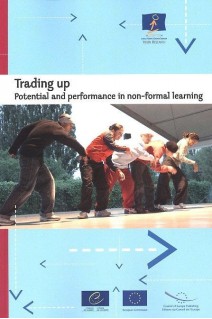



Understanding, explicating, recognising and evaluating the quality of non-formal learning in the youth sector are questions for which researchers, policymakers and those working with young people are now trying to find answers. Developing productive relations between non-formal learning in schooling, higher, continuing and vocational education and employment is a more recent concern. The European Commission and Council of Europe Partnership Programme on Youth Research 2003-2005 held a seminar in April 2004 to debate these issues, starting with the view that learning is important wherever it takes place, in so far as it contributes towards fostering personal development, active citizenship, employability and social inclusion.This publication supports current efforts at European and national levels to improve the quality and recognition of non-formal learning not only in the youth sector, but also in other education and training contexts.
Foreword by Mark Taylor
1. Introduction: tracks and tools for trading up in non-formal learning. By Lynne Chisholm and Bryony Hoskins
2. What does learning mean in the "Learning Society"? by Manuela du Bois-Reymond
Intermezzo i: from policy to practices by Lynne Chisholm and Bryony Hoskins
3. Formal and informal models of mentoring for young people: issues for democratic and emancipatory practice by Helen Colley
4. Family skills as a potential source of innovative human resources development by Annemarie Gerzer-Sass
Intermezzo ii: from practices to participants by Lynne Chisholm and Bryony Hoskins
5. Formalising the non-formal: potentials of sociality and the recognition of non-formal learning outcomes by Torben Bechmann Jensen
6. Making non-formal and informal learning visible through digital portfolios by Anna Maria Ajello and Cristina Belardi
7. Portfolio-building as a tool for self-reflectivity on a micro and a macro level of society - the german case by Rudiger Preifter
Intermezzo iii: from participants to professionalisation by Lynne Chisholm and Bryony Hoskins
8. Ritual performance and language in non-formal learning by Marianne Sogaard Sorensen
9. Individual learning in non-formal education: interaction between trainers' and participants' views on individual learning by Erzsebet Kovdcs
Intermezzo iv: from professionalisation to policy by Lynne Chisholm and Bryony Hoskins
10. Quality assurance of youth work initial professional training in England by Liz Morrey and Steve Drowley
11. Recognition of non-formal learning outcomes at the University of Malta by Anthony Azzopardi
12. Civil society building in Azerbaijan by Sara Rzayeva andAndreas Karsten
13. Conclusions by Lynne Chisholm and Bryony Hoskins

Understanding, explicating, recognising and evaluating the quality of non-formal learning in the youth sector are questions for which researchers, policymakers and those working with young people are now trying to find answers. Developing productive relations between non-formal learning in schooling, higher, continuing and vocational education and employment is a more recent concern. The European Commission and Council of Europe Partnership Programme on Youth Research 2003-2005 held a seminar in April 2004 to debate these issues, starting with the view that learning is important wherever it takes place, in so far as it contributes towards fostering personal development, active citizenship, employability and social inclusion.This publication supports current efforts at European and national levels to improve the quality and recognition of non-formal learning not only in the youth sector, but also in other education and training contexts.
Attention, en vertu de nos conditions générales de vente, l'achat des PDF/epub est réservé aux particuliers.
